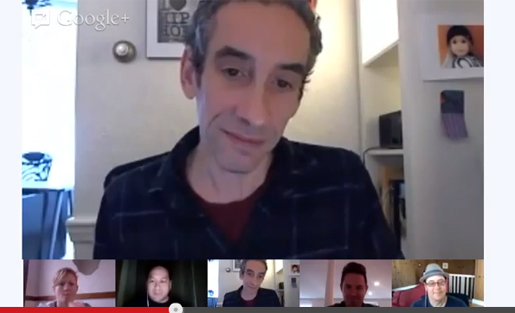We’ve had a great run so far with our weekly Mediatwits podcast, with 124 great episodes on topics as varied as personal brand journalism to the dominance of cats online. And our guests and regulars have been a diverse group, including Ana Marie Cox, Felix Salmon, Monica Guzman, Andrew Lih, Douglas Rushkoff, Andrew Sullivan, Emily Bell and Joshua Johnson.
Initially launched as an audio-only podcast with co-host Rafat Ali, the show changed into a roundtable format with regulars and a few special guests. We went from Libsyn to iTunes to SoundCloud and Google Hangouts and YouTube. It’s been a fun ride so far, and we appreciate all the people who shared their knowledge on the show.
The time has come to take a step back and figure out the future of the show. Should it go back to audio-only? Become a radio show? Continue as video and audio? Become shorter and more YouTube-friendly? There are a lot of options to consider. Please leave us your own feedback in the comments below or on our Feedback Form.
Meanwhile, here are some lessons we’ve learned using this audio/video format on Google Hangouts on Air.
Lessons Learned by the Mediatwits
1. Back it up.
When using Google Hangouts on Air for the podcast, we once had a fatal error when the person recording the show (me) had a computer meltdown. Make sure you have a solid computer and solid Internet connection when you are the one recording the show. Otherwise you can lose the entire show in the blink of an eye. We were fortunate to have Google helping us out with tech support but sometimes it’s impossible to recover what’s lost.
2. Test your connections ahead of time.
When using this kind of technology to record shows with people scattered at various remote locations, it’s of paramount importance to test connections ahead of time. Taking the time for these tech tests is important, and we usually had people come on about 15 minutes ahead of recording the show to test their setup.

3. Book one more person than you think you need.
Because of various glitches and people dropping off, it’s always good to have one extra person per show, just in case someone can’t connect properly. That way you don’t come up short with people.
4. Have your guests help promote the shows.
Some of our most-watched shows included guests such as Andrew Sullivan, who embedded our podcast on his highly trafficked blog, and Robert Scoble, who posted links to the show on his social media accounts.
5. Get your producer onto the show.
When using Google Hangouts on Air, it’s a good idea to have your producer on the show and part of the mix. We were lucky to have Zach Cohen, Claire Groden and Fannie Cohen as producers the past couple years. Fannie especially mastered the art of doing screen-shares on the fly as guests discussed projects, apps or websites.

A screen-share during the Mediatwits podcast on the future of radio
6. Measurement is hard.
When you have a show that runs on Google Hangouts, YouTube, SoundCloud, iTunes, PBS MediaShift, Stitcher, Feedburner, PRX and who-knows-where with embeds, measuring the audience gets to be very complicated. We can add up numbers on all the various platforms, but it’s still hard to tell how many total subscribers we have for the show. This makes it difficult to monetize the show with sponsors.
7. Reaching influencers matters.
Despite some of the audience numbers being hard to gauge, and sometimes low, I’m amazed how many times influential people mention the show and how they just watched it when I see them. I always wonder exactly who is watching, and then prominent people mention how much they like the show. So even if it’s hard to build a business around the podcast, there is value in bringing together a great group of people for a deeper discussion of digital media issues.
And in the end, I think that’s what’s mattered most about the podcast: making a difference. If we can reach and satisfy a smaller number of people who care about the issues, maybe that matters more than having a mass audience that isn’t really engaged. We’ll consider many options as we move forward in the fall, but we will continue to put our audience first when considering the format, tone and content.
Mark Glaser is executive editor and publisher of MediaShift and Idea Lab. He also writes the bi-weekly OPA Intelligence Report email newsletter for the Online Publishers Association. He lives in San Francisco with his wife Renee and sons Julian and Everett. You can follow him on Twitter @mediatwit and Circle him on Google+


I love the show and I’ve learned a ton. You’re doing an amazing job finding experts and diving into some complex issues around media in the digital age. If I have a gripe, it relates to fidelity. The audio quality isn’t great when I listen to it on BeyondPod (want to be specific.) Perhaps there’s a way to improve the audio experience somehow. I know it’s essentially a line-in to a Google Hangout but it should be possible to at least have the host have good fidelity, even if it’s more difficult to control the guests who dial in. Anyway, love the show and hope to hear more!